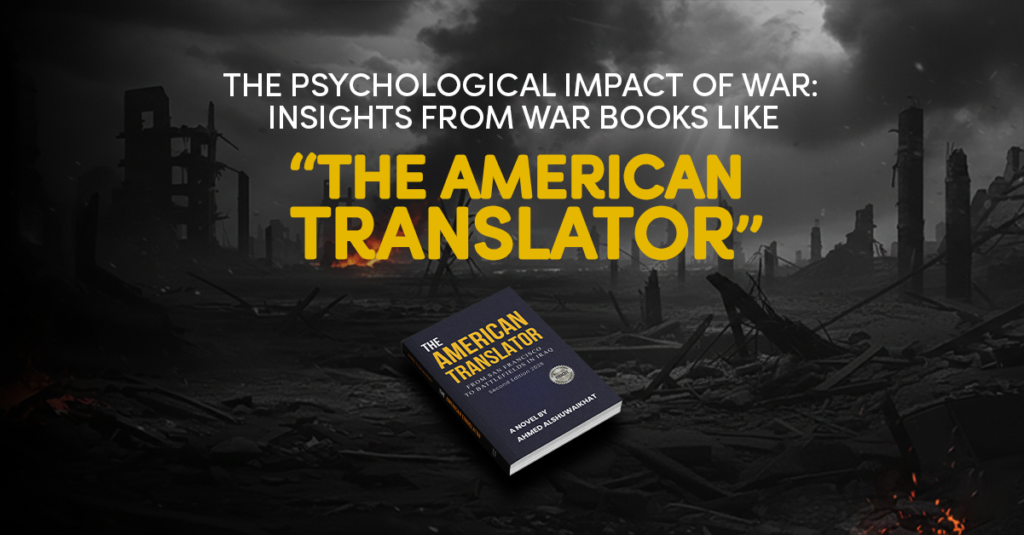War Books and Their Exploration of Psychological Trauma
As war has been a central theme in literature for centuries, with many authors attempting to capture its devastating effects on individuals and societies. War books offer deep insights into the psychological, emotional, and moral dilemmas faced by those involved in conflicts. Among these, “The American Translator” by Ahmed Alshuwaikhat stands out as a compelling narrative that examines the psychological impact of war on both soldiers and civilians. The novel provides a thought-provoking perspective on the internal struggles of those caught in war zones, making it a significant contribution to the genre of war books.
The Psychological Toll of War in “The American Translator”
Set against the backdrop of the Iraq War, ” The American Translator” presents a gripping portrayal of the mental and emotional toll that war takes on individuals. The protagonist, David Boccaccio, is an interpreter navigating the treacherous landscape of war-torn Iraq. His position as a translator places him in a unique role, allowing him to witness the horrors of war firsthand. This perspective sheds light on the deep psychological scars left by war, making the novel a poignant addition to the growing body of as a war book that explore the mental burdens of conflict.
Emotional Turmoil and Moral Dilemmas in War Books
One of the most striking aspects of “The American Translator” is its raw depiction of emotional turmoil experienced by both military personnel and civilians. The novel vividly illustrates the chaos, violence, and destruction that war brings, leading to a pervasive sense of hopelessness. Characters are forced to confront fear, anxiety, and guilt, which mirror the internal battles fought alongside the physical ones. David, for instance, struggles with the deaths of soldiers and the suffering of innocent civilians, bringing to the forefront the moral dilemmas faced by those engaged in war. This sense of moral ambiguity is a recurring theme in many war books, as it highlights the psychological distress that often accompanies armed conflict.
Isolation and Identity Crisis in The American Translator
Beyond the immediate horrors of war, the novel also explores the theme of isolation, a common experience for individuals affected by conflict. David finds himself increasingly alienated, trapped between two cultures—the American military and the Iraqi civilian population. His relationships become strained, and his sense of identity is constantly challenged. This cultural dissonance intensifies his loneliness and despair, underscoring how war fractures not only communities but also personal identities. Many war novels delve into this theme, illustrating how conflict leads to feelings of detachment and emotional numbness.
The Psychological Burden on Soldiers
The psychological burden of war is further examined through the character of Firas Ibrahim, a former colonel in the Iraqi army. Firas embodies the conflicted mindset of a soldier torn between duty and conscience. His transformation from a military leader to a figure of resistance exemplifies the internal struggles faced by many soldiers who grapple with their past decisions. This emotional turmoil is a recurring element in war books, emphasizing how war reshapes individuals’ mental states, often leading to despair and a sense of loss.
Societal Consequences of War Trauma
Beyond individual struggles, “The American Translator” also highlights the broader societal effects of war on mental health. The trauma endured by individuals extends to entire communities, creating cycles of suffering and violence. The novel suggests that addressing the psychological impact of war requires not only personal healing but also broader societal efforts. War books often emphasize this aspect, illustrating the far-reaching consequences of conflict beyond the battlefield.
Conclusion: The Role of Novel in Understanding Psychological Scars
In conclusion, “The American Translator” is a profound exploration of the psychological effects of war, offering readers a glimpse into the emotional and mental toll experienced by those in war zones. Through its compelling narrative and deeply developed characters, the novel contributes significantly to the genre of war books. By shedding light on themes of fear, isolation, and moral conflict, it provides invaluable insights into the complexities of human resilience in times of war. As readers immerse themselves in this thought-provoking novel, they gain a deeper appreciation for the lasting psychological scars inflicted by war, reinforcing the importance of understanding and addressing these effects in both literature and reality.
The Psychological Scars of War – Discover The American Translator on Amazon
War books reveal more than just battles—they uncover the hidden trauma, moral struggles, and identity crises faced by those caught in conflict. In The American Translator, Ahmed Alshuwaikhat delivers a gripping psychological exploration of war’s emotional toll on soldiers and civilians alike.
Gain a deeper understanding of the mental impact of war—order now on Amazon.











